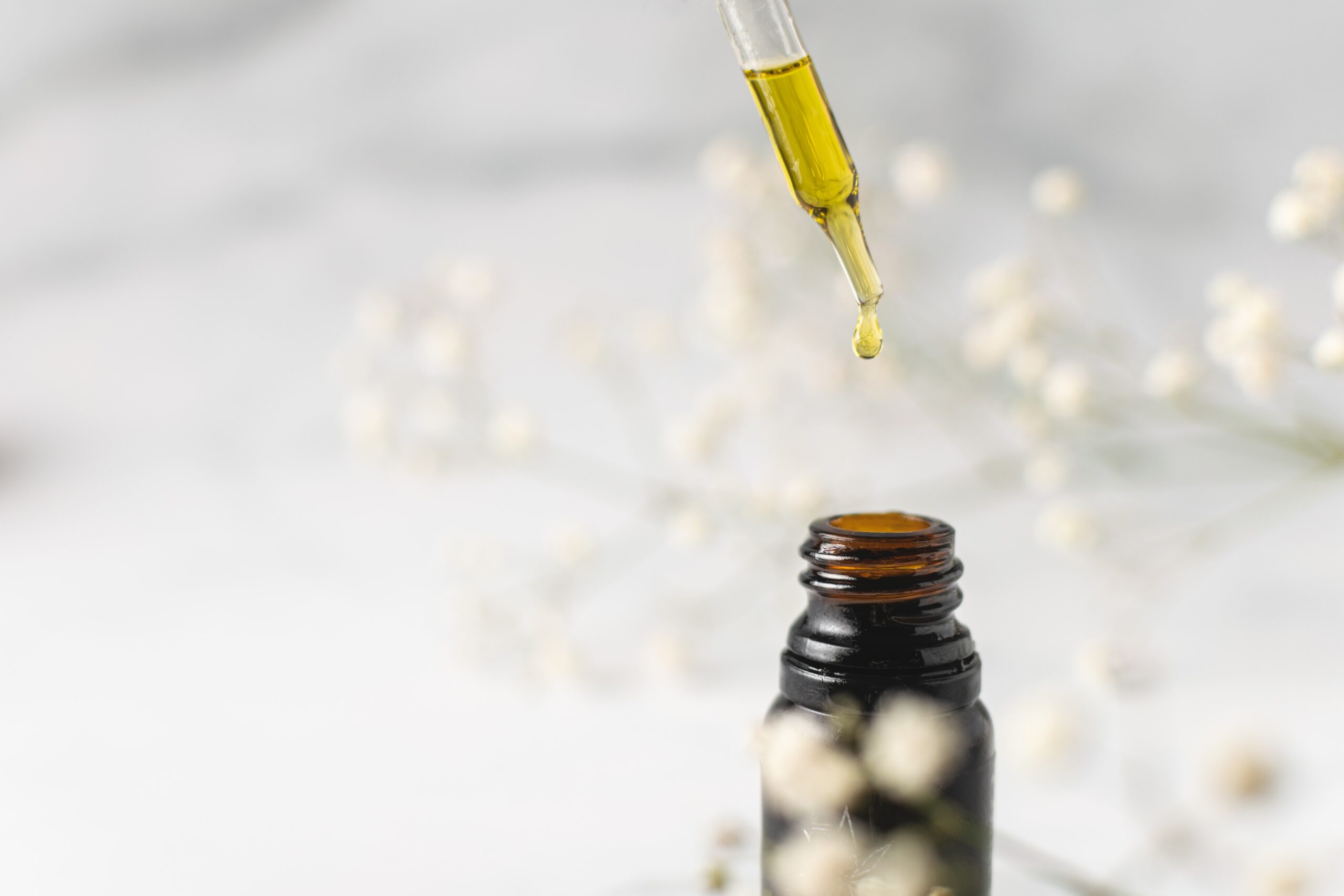Table of Contents [show]

CBD and its Benefits – An Introduction
Feeling a little spacey? Can’t seem to focus or get a good night’s sleep? You’re not alone. In today’s fast-paced world, stress and distractions can easily throw us off balance. But fear not! There may be a solution that could help you find your center and reclaim your productivity – CBD.
CBD, short for cannabidiol, has been gaining popularity in recent years for its potential health benefits. From reducing anxiety to improving sleep quality, this natural compound derived from the hemp plant is capturing the attention of many seeking alternative remedies.
But before we dive into how CBD might just be the answer you’ve been looking for, let’s first understand what exactly it is and how it works its magic on our bodies and minds. So buckle up as we embark on a journey through the science of CBD, debunk common misconceptions surrounding it, and explore how it can bring about improved sleep and clarity in our lives. Get ready to feel like yourself again!
What is CBD?
CBD is one of over 100 chemical compounds found in cannabis plants known as cannabinoids. Unlike its infamous counterpart THC (tetrahydrocannabinol), which produces psychoactive effects responsible for that “high” feeling, CBD does not induce any mind-altering sensations.
Instead, it interacts with receptors in our body’s endocannabinoid system (ECS), helping restore balance by regulating various bodily functions such as mood, pain perception, immune response, and yes – even sleep patterns.
How Does CBD Work?
Now that we know what CBD is let’s delve into the nitty-gritty of how it actually works within our bodies. The ECS plays a vital role in maintaining homeostasis or equilibrium throughout different systems – think of it as the conductor orchestrating harmony within your body orchestra!
When we introduce CBD into our system via ingestion or topical application (no worries – no rolling papers required here!), it interacts with receptors in the ECS, promoting balance and stability. This interaction can help alleviate feelings of
CBD, short for cannabidiol, is a natural compound found in the cannabis plant. Unlike its well-known counterpart THC (tetrahydrocannabinol), CBD does not cause psychoactive effects or a feeling of being “high.” Instead, it offers a wide range of potential health benefits.
CBD works by interacting with our body’s endocannabinoid system (ECS), which plays a crucial role in maintaining balance and harmony within the body. The ECS regulates various bodily functions such as mood, sleep, appetite, and immune response.
One common misconception about CBD is that it only comes from marijuana plants. However, CBD can also be derived from hemp plants, which contain minimal levels of THC. This makes hemp-derived CBD legal in many countries.
Scientific research has shown that CBD has anti-inflammatory properties and may help alleviate symptoms related to anxiety disorders such as social anxiety and post-traumatic stress disorder (PTSD). It may also promote relaxation without causing drowsiness or impairing cognitive function.
In addition to its potential anxiolytic effects, many people turn to CBD for improved focus and clarity. Some individuals report enhanced mental alertness after using CBD products. This could be attributed to the interaction between CBD and receptors involved in attention regulation.
Another area where CBD shows promise is sleep improvement. Many individuals struggle with insomnia or have difficulty falling asleep due to stress or other factors. Preliminary studies suggest that taking CBD before bedtime might help promote better sleep quality by reducing anxiety and promoting relaxation.
It’s important to note that individual experiences with CBD can vary based on several factors including dosage, frequency of use, method of consumption, overall health condition, and metabolism rate among others.
In conclusion, CBD holds great potential as a natural remedy for various health concerns including anxiety relief,focus enhancement,and improved sleep quality.
However,it’s essential to do thorough research,talk to your healthcare provider,and choose high-quality CBD products to ensure safety and effectiveness in achieving the desired benefits.
Common Misconceptions about CBD
CBD, short for cannabidiol, has gained significant attention in recent years due to its potential health benefits. However, with this surge in popularity comes a fair share of misconceptions and misunderstandings surrounding CBD. Let’s take a closer look at some common misconceptions about CBD.
One misconception is that CBD will get you high. Unlike THC (tetrahydrocannabinol), the psychoactive compound found in marijuana, CBD does not produce any intoxicating effects. It is non-psychoactive and won’t alter your state of mind.
Another misconception is that all CBD products are the same. In reality, there are various types of CBD products available on the market, including isolates, full-spectrum oils, and broad-spectrum oils. Each type has different compositions and may provide distinct effects.
Some people believe that using CBD will lead to addiction or dependence. However, numerous studies have shown that CBD does not possess addictive properties like opioids or other substances that create dependency.
There is also a misconception that higher doses of CBD are always better. While it’s important to find an effective dose for your individual needs, taking excessive amounts of CBD may result in diminishing returns or unwanted side effects.
Many individuals assume that since hemp-derived products are legal federally in the United States as per the 2018 Farm Bill Act; they can freely use them without any risks or concerns. However, it’s essential to research local laws and regulations regarding the purchase and use of these products as they can vary from state to state.
By addressing these misconceptions head-on and providing accurate information about how CBD works within our bodies’ endocannabinoid system; we can promote a clearer understanding of this amazing compound.
The Science Behind CBD
When it comes to the science behind CBD, there is still much that researchers are uncovering. However, what we do know so far is quite fascinating! CBD, short for cannabidiol, is one of over 100 chemical compounds called cannabinoids found in the cannabis plant.
CBD interacts with our body’s endocannabinoid system (ECS), a complex network of receptors and neurotransmitters responsible for maintaining balance and harmony within our bodies. The ECS plays a crucial role in regulating various functions such as sleep, mood, appetite, and immune response.
Research suggests that CBD works by indirectly influencing these receptors in the ECS. It may help increase levels of naturally occurring endocannabinoids or inhibit enzymes that break them down. This interaction helps promote balance and homeostasis throughout the body.
One misconception about CBD is that it causes a “high” like THC, another compound found in cannabis. However, this couldn’t be further from the truth! Unlike THC, which has psychoactive properties, CBD does not produce any intoxicating effects.
Studies have shown promising results regarding the potential benefits of using CBD for anxiety relief. By interacting with serotonin receptors in the brain known to regulate mood and emotions, CBD may help reduce feelings of anxiety and promote a sense of calmness.
Additionally Research also indicates that taking CBD may improve focus and clarity by reducing distractions caused by racing thoughts or stress. By calming an overactive mind without impairing cognitive function or alertness like some traditional medications can do!
Another area where scientific research supports the use of CBD is sleep improvement. Many individuals struggle with falling asleep or staying asleep throughout the night due to various factors such as stress or chronic pain.
CBD has been found to have sedative-like effects at higher doses making it potentially beneficial for those struggling with insomnia.
The relaxing properties of CDB can create a more conducive environment for quality sleep resulting in improved restfulness upon waking up.
It’s important to note that the effects of CBD can vary from person to
The Effects of CBD on Anxiety
Living with anxiety can be overwhelming and debilitating. It affects millions of people worldwide, making it one of the most prevalent mental health disorders. While there are various treatment options available, many individuals are now turning to CBD as a natural alternative.
CBD, short for cannabidiol, is a compound derived from the cannabis plant. Unlike its counterpart THC, CBD does not produce psychoactive effects or make you feel high. Instead, it interacts with your body’s endocannabinoid system to promote balance and overall well-being.
Numerous studies have shown promising results when it comes to using CBD for anxiety relief. Research suggests that CBD may help reduce symptoms such as excessive worry, panic attacks, and social anxiety disorder.
So how exactly does CBD work its magic? Well, our bodies have receptors in the brain called CB1 receptors that play a crucial role in regulating anxiety levels. When we consume CBD, it indirectly influences these receptors by increasing serotonin levels in the brain – a neurotransmitter known for its mood-regulating properties.
Additionally, CBD has been found to interact with other receptors involved in stress response systems such as TRPV1 and GABA receptors. These interactions further contribute to its potential anti-anxiety effects.
It’s important to note that everyone’s experience with CBD may vary due to individual factors such as dosage and metabolism rate. Some people report feeling immediate relief after taking CBD oil or capsules, while others may require consistent use over time before noticing significant changes.
If you’re considering trying CBD for your anxiety symptoms, it’s essential to consult with a healthcare professional who can provide guidance tailored specifically to your needs. They can help determine proper dosage and ensure any potential drug interactions are considered.
In conclusion (as per instructions), although more research is needed in this area, preliminary evidence shows promise for using CBD as an alternative treatment option for managing anxiety symptoms effectively.
CBD for Focus and Clarity
When it comes to getting through a long workday or staying focused on important tasks, many of us could use an extra boost. While some turn to caffeine or other stimulants, others are seeking natural alternatives like CBD.
CBD, short for cannabidiol, is a compound found in the cannabis plant. Unlike its cousin THC, CBD does not have psychoactive effects and will not get you “high.” Instead, it interacts with our body’s endocannabinoid system to promote balance and overall well-being.
Research suggests that CBD may play a role in enhancing focus and clarity. By reducing anxiety and promoting relaxation, CBD can help calm racing thoughts that often hinder productivity. It has also been shown to improve cognitive function by increasing blood flow to the brain.
Additionally, CBD is believed to have neuroprotective properties that could potentially benefit those struggling with conditions such as ADHD or brain fog. While more research is needed in these areas, anecdotal evidence from users suggests promising results.
It’s important to note that individual experiences with CBD can vary significantly due to factors such as dosage and personal biochemistry. Some people may find immediate improvements in focus after taking CBD, while others may need more time or different dosages for optimal results.
If you’re considering using CBD for focus and clarity, it’s always best to start with a low dose and gradually increase until you find what works best for you. Consulting with a healthcare professional knowledgeable about cannabinoids can also provide valuable insights tailored specifically to your needs.
In conclusion, while more studies are needed on the specific effects of CBD on focus and clarity, many individuals report positive experiences when incorporating this natural compound into their daily routine. Whether it’s calming anxious thoughts or supporting cognitive function, CBD shows promise as a potential aid for achieving greater mental acuity throughout the day.
Improved Sleep with CBD
Are you tired of tossing and turning all night, desperately seeking a good night’s rest? Look no further than CBD. This natural compound has been gaining popularity for its potential to promote better sleep and help individuals wake up feeling refreshed.
So how exactly does CBD improve sleep? It primarily interacts with the body’s endocannabinoid system (ECS), which plays a crucial role in regulating various bodily functions, including sleep. By interacting with ECS receptors, CBD can help balance and regulate sleep patterns.
One of the most common causes of poor sleep is anxiety or racing thoughts that keep us awake at night. Thankfully, studies have shown that CBD may have anxiolytic properties, meaning it can reduce feelings of anxiety and promote relaxation. By calming the mind and alleviating stress before bedtime, CBD can create an environment more conducive to falling asleep quickly.
CBD also has the ability to address underlying issues that may be disrupting our sleep cycle. For example, pain from conditions such as arthritis or chronic pain syndromes can make it difficult to find comfort in bed. By reducing inflammation and providing analgesic effects, CBD may help alleviate discomfort and enable a peaceful slumber.
Another way that CBD contributes to improved sleep is through its impact on REM (rapid eye movement) behavior disorder. During REM sleep, our bodies typically experience temporary paralysis called REM atonia to prevent us from acting out our dreams physically.
However, some individuals suffer from REM behavior disorder where this paralysis fails to occur. This leads to disruptive movements during dreams that often result in waking up repeatedly throughout the night. Studies suggest that by modulating serotonin levels – a neurotransmitter involved in mood regulation –C BD might mitigate these symptoms and promote deeper uninterrupted sleep.
It’s important to note that while many people report positive experiences with using C BD for better s leep , individual results may vary . Factors such as dosage , genetics , overall health , and lifestyle can influence how C BD affects each person. Additionally, it’s always
Factors that Influence CBD’s Effects on Individuals
When it comes to the effects of CBD on individuals, there are several factors at play. First and foremost, dosage plays a significant role in determining how CBD will affect you. The amount of CBD you take can impact its potency and duration of effects.
Another important factor is your body chemistry. Each person’s body processes substances differently, so what works for one person may not have the same effect on another. This means that finding the right dosage and method of consumption might require some trial and error.
Additionally, individual lifestyle choices can influence how CBD affects you. Factors such as diet, exercise habits, and overall health can all play a role in how your body responds to CBD.
Furthermore, the quality and purity of the CBD product itself can also impact its effectiveness. It’s essential to choose high-quality products from reputable sources to ensure you’re getting the best results.
It’s worth noting that everyone has different reasons for using CBD. Some may be seeking relief from anxiety or pain, while others may be looking for improved sleep or focus. These varying goals can influence how individuals perceive and experience the effects of CBD.
When considering the effects of CBD on individuals, dosage, body chemistry, lifestyle choices, product quality, and personal goals all come into play. By understanding these factors
and experimenting with different dosages and consumption methods, you’ll be better equipped to find what works best for you personally.
Remember: always consult with a healthcare professional before incorporating any new supplements or medications into your routine.
Conclusion
CBD has shown great promise in providing numerous benefits to individuals seeking improved sleep, anxiety relief, and enhanced focus and clarity. Contrary to common misconceptions, CBD does not cause spaciness or impair cognitive function. Instead, it works by interacting with the body’s endocannabinoid system to promote balance and well-being.
The science behind CBD is fascinating, as researchers continue to uncover its potential therapeutic effects. From reducing anxiety symptoms to improving sleep quality, CBD offers a natural alternative for those seeking relief from various ailments.
While CBD can be beneficial for many individuals, it is important to note that its effects may vary depending on factors such as dosage, individual metabolism, and overall health. It is always advisable to consult with a healthcare professional before incorporating CBD into your wellness routine.
With more research being conducted on the benefits of CBD and the growing acceptance of cannabis-derived products in society today, it is becoming increasingly clear that this compound holds immense potential for improving our overall well-being.
So if you’ve been feeling a little spacey lately or struggling with anxiety or sleep issues, don’t dismiss the possibility of trying out CBD as part of your self-care regimen. Remember to choose high-quality products from reputable sources and start with low doses while gradually increasing them if needed.
Only you can decide what works best for your body. But with the mounting evidence supporting its efficacy and safety profile when used responsibly, exploring the world of CBD might just lead you down a path towards improved sleep quality and a greater sense of well-being!
CBD Articles in Spinfuel (just a few)
8 Incredible Benefits of CBD to Improve Your Health and Well-Being
Are the Benefits of Full Spectrum CBD Miraculous or a Hoax?
CBD and THC – Why CBD Doesn’t Get You High – A 2023 Perspective



